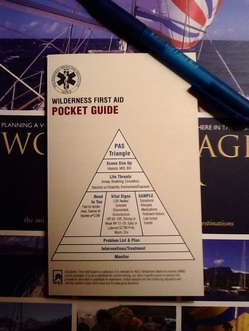
What's a WFA?
This past weekend we took a 2-day course on Wilderness First Aid. Operated by NOLS, a leading outdoor education school, the WFA course teaches first aid from the standpoint of being far from help... hours, if not days. They show you how to treat wounds, tape sprains, splint fractures, fix dislocations, recognize dehydration, shock, hypothermia, etc.
Each day is an exhausting 9 hours with a lunch. They intersperse classroom lectures with real scenarios. Students take turns being the victim, each time briefed as to their dilemma, and the team of 2-3 rescuers must approach and help. Once I was bouldering in Joshua Tree, lost my handhold, fell 15 ft and hit my head on a rock. Another time I had hiked 15 miles on the Pacific Crest Trail in 8 hrs, only had 1liter of water and felt dizzy and nauseous. Hmmm, dehydration? We even get fake bruises or blood makeup.
As the responders, we are taught to assess the situation, check for airway, breathing, bleeding, pain and circulation issues. We learned how to ask questions about what happened and extract pertinent info like medications, food and water intake, allergies, etc. Finally, we practiced calling in a report for the professional rescue team.
Now, not that I remembered half of what I saw, but I learned a couple important things.
1. I did not go into the medical field for good reason. My bedside manner is lacking, to say the least. In fact, notice above that I call the patient "victim". That was my brain not even trying to be funny. Because God forbid I'm the one who happens across them. It takes a real innate ability to exhibit a calm, easygoing, bedside manner. I'm not one of the fortunate, good thing my only patient will be Brian who is used to me poking and prodding and peppering with questions... Does this hurt? How about now? Ooowwwww!
2. Although hiking is the typical scenario, we took this course because we'll be far away from land often. Things can happen, you get whacked by the boom, break a toe on a cleat, get burned by boiling water in a rolly sea... So I think Brian is slightly more reassured that I can temporarily "fix" him if something happens. I did say slightly. He has lots of training from the military about shock and dehydration and wound care and such, but I have had zero. I could apply a bandaid. Period. The fact that I can now treat a burn, or remember how as long as I have my handy dandy field guide, and I won't be so nervous about it, puts me one step closer to both of us being confident we can take care of each other.
3. No joke, I have seriously always wondered about how to fix a dislocated shoulder. I've never had it, but in the movies it looks horrifically painful and the actor always seems to whack their shoulder on something immovable to violently shove it back in. Luckily, I learned all you have to do is dangle your arm while laying on a table, strap a 10-15 pound weight to your arm and gravity will do the rest. I don't know why this makes me feel better. It just does. It's literally the best thing I learned. I'm sure our highly competent instructors would roll their eyes at me right now. Seriously? Out of everything?
As a side note...
Most of the participants were hikers, some climbers, but quite a few were planning on hiking the Pacific Coast Trail. One younger couple just quit their jobs and are planning on through-hiking the entire thing, from the Mexican to Canadian border - this not-so-small undertaking is a typical 6-month stint. Very cool... and impressive.

 RSS Feed
RSS Feed
